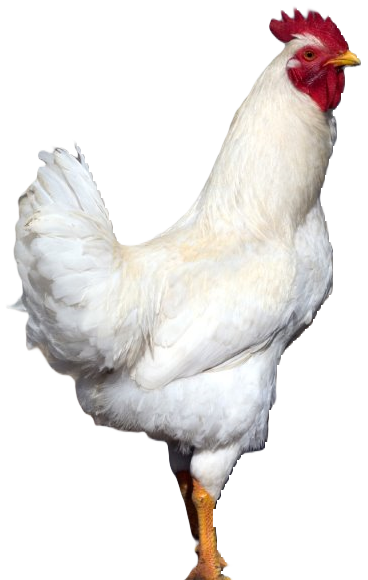
Rhode Island, WHAT? No, that’s Rhode Island White chicken, a breed that has caught the attention of poultry hobbyists and farmers alike. As you can see, this chicken looks like a Rhode Island Red except for the color. This article is about the charm and reliability this bird has to offer.
In my opinion, a few critical attributes of this breed stand out. The Rhode Island White is known for its plump body and bright red comb, making it a good-looking and hardy bird. Its feathers are a clean white that can brighten up any coop.
It has a dual-purpose classification, allowing owners the flexibility to cultivate them for either eggs or meat, or both. This breed is also known as a calm, friendly bird, which may make it a great addition to family farms and backyard coops.
Suppose you want to understand the how and why behind the Rhode Island White chicken’s qualities; it’s essential to dig into its origins. So, where did this breed come from, and how has it evolved into the bird we know and love today?
That’s precisely what the next section is all about—the history and origins of the Rhode Island White chicken. From its emergence in the American Northeast to its role worldwide, knowing its background provides a much richer understanding of the breed.
The History of the Rhode Island White Chicken
So, you’re eager to learn about the Rhode Island White chicken’s origins? I’m going to help you explore just that. The breed resulted from a quest for a bird that could excel in productivity.
It was back in the late 19th and early 20th centuries in the U.S. state of Rhode Island where all the magic happened. Breeders carefully combined several existing breeds, like the White Wyandotte with a rose comb and the Rhode Island Red.
This meticulous crossbreeding led to the creation of the Rhode Island White, a bird not only distinct in its snowy plumage but also in its hardiness.
These chickens weren’t just a food source; they became a symbol of self-reliance for many American smallholders.
They helped families sustain themselves during tough economic times. The ability to provide a regular supply of eggs and meat made them quite the backyard staple.
Appreciating the historical journey of the Rhode Island White from the past to the present isn’t just about recognizing its farming significance. It also involves understanding changes in breeding for resilience, efficiency, and adaptability. And guess what? They are still around, holding their legacy of hardiness and reliability in the contemporary small-scale farming and homesteading scenarios.
This bridging from the historical purpose to the present-day roles paints a complete picture of the breed’s durability and ongoing popularity.
This is crucial for establishing the breed’s current context, making it meaningful if you consider adding these birds to your flock.
I’m setting you up with this backdrop so you can fully appreciate what Rhode Island Whites bring to your homestead today, which I will explore in the next section.
Rhode Island White’s Purpose and Performance

This breed is predominantly for laying and meat production and stands out as a dual-purpose champion.
Rhode Island White hens typically weigh around 6.5 to 7.5 pounds, while the males, or roosters, can weigh between 8.5 and 9.5 pounds.
Now, that’s quite sturdy, placing them comfortably in the category of medium-sized chickens that can contribute heartily to both egg and meat production.
In my opinion, the egg-laying prowess of this breed is impressive.
You’ll discover that these chickens are reliable layers, providing about 200 to 280 large, brown eggs annually. That means you could collect eggs nearly daily with just a few of these birds. That’s almost on par with the Leghorns.
These figures and stats are fascinating; they shape whether the Rhode Island White aligns with your farming goals. You can always adjust your approach, but knowing these birds’ capabilities will have you starting on the right foot.
Adapting to Climates and Assessing the Breed’s Care
Now, let’s talk about how the Rhode Island White chicken holds up under various weather conditions. If you live in an area with extreme temperatures, you’re in luck: this breed is renowned for being cold-hardy.
Thanks to their dense feathering, they can withstand chillier climates, making them a reliable choice for northern farmers. But don’t worry if you’re in a warmer region; they can manage heat reasonably well, though they’ll need shade and plenty of water to stay cool during hot spells.
Generally, Rhode Island Whites are known to be calm and friendly creatures. Their easygoing nature makes them an excellent choice for backyard chicken flocks. Patience is a hallmark of their demeanor, which is handy if they interact with children or other pets.
Their foraging habits are another plus. These chickens are good foragers and are pretty thorough, which can help keep your yard free of pests. Letting them roam can also lead to happier, healthier chickens and reduce your feed costs.
While they aren’t prone to any particular disease, routine check-ups and vaccinations should be part of your care routine to maintain a healthy flock. Keep an eye out for the common issues that affect all chickens, such as mites and lice.
Regarding special care needs, Rhode Island Whites don’t require much more than the average chicken. However, because of their substantial feathering during molting or squalid conditions, they might need a little extra attention to ensure their feathers stay clean and mite-free.
Regular coop cleaning, a nutritious diet, and a safe, spacious environment are your keys to raising a thriving Rhode Island White chicken.
Thoughts on Raising Rhode Island White Chickens
In my opinion, the Rhode Island White Chicken is a breed that’s full of surprises and good qualities. You’ve learned about their origins, dual-purpose nature, and the practical aspects of their care and temperament.
Maybe you’re thinking about adding these birds to your flock or curious about different chicken breeds. Either way, the Rhode Island White is a vigorous and reliable choice. These chickens are both cold-hardy and heat-tolerant.
Rhode Island Whites could be a perfect match if your priorities include a calm temperament, good foraging skills, and a reasonable level of egg production.
Not to say they don’t come with challenges; no chicken breed is entirely free from health concerns, but these birds are not particularly prone to disease. That said, always watch out for the usual chicken ailments and provide them with the necessary care.
Raising chickens, including Rhode Island Whites, is an ongoing learning experience. Your first attempt doesn’t need to be perfect. It’s a journey with the birds, understanding and catering to their needs and rejoicing in the rewards they bring.
If this is your first go-round with them, they will be like any pet in time. You will come to know each chicken, loving some and tolerating others. I’m sure the Rhode Island White will be one of your favorites.
Thanks for reading, and take good care of yourself.
Dave
Chickenmethod.com
